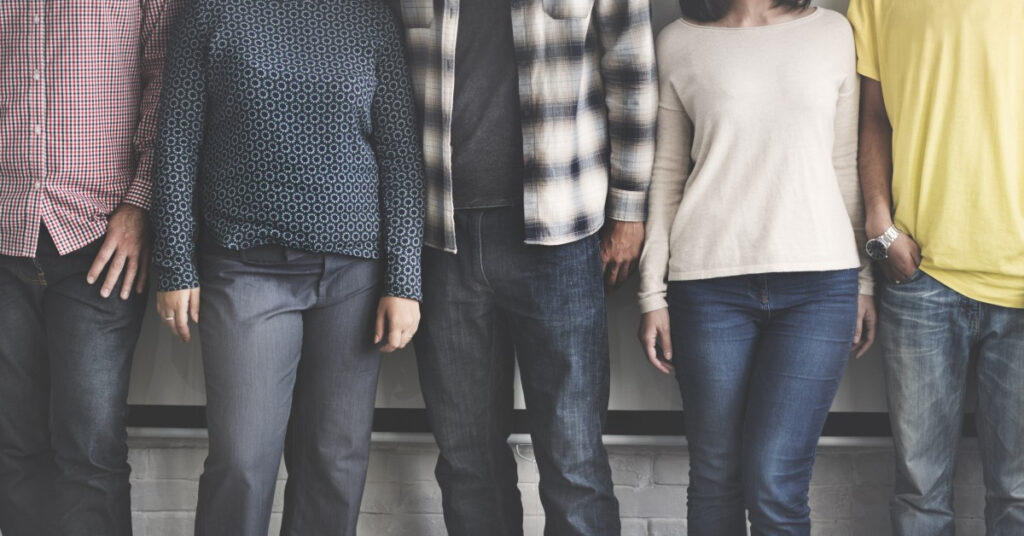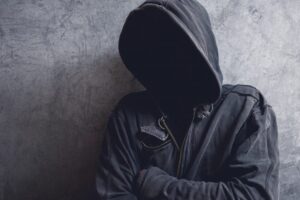No one knew why the Mark appeared, but everyone knew it was something to be feared.
It never mattered who the newly-Marked person was, or rather who they were before. It didn’t matter if they were the world’s most moving artist, an author with their book constantly #1 on the best-sellers list, a popular social media influencer, or just a young middle-schooler who wanted nothing exciting to happen in his life. It didn’t matter if they were a good person or bad. It really didn’t matter who the person was before the Mark appeared, because once it did, they were immediately considered as nothing more than their Mark.
And that’s simply how it was.

The small symbol, a crescent balancing on the point of a little triangle, was what set the Marked apart from the rest. Countless studies had been done in order to discover where it came from, what it meant, or why it appeared, but to no avail. The only conclusion that anyone could come up with is that there wasn’t really a pattern – it struck where it wanted. Some people thought it was in some way hereditary. Others thought that somehow the people chose to take the Mark upon themselves. And some believed that it was the evidence that someone – the victims themselves, a family member, or perhaps an enemy – had made a deal with the Devil, who then left his brand on the person he would soon drag down clawing and screaming to the Pit.
The truth was, there was not a single person in the world that truly knew the reason it emerged. But everyone, religious, superstitious, or unbelieving in anything of the sort, saw the Mark as a plague worse than death.
That’s why Alex was horrified when he found the Mark there on the back of his neck early one morning. It was fresh, barely fading into view. In fact, it was hardly there at all, more a whisper than the real thing, like someone had drawn it there in pencil.
But it was there.
He tried to scrub it away with soap and water. That didn’t work. Neither did the bath sponge. He even tried using the toothbrush his mom kept below the sink for detailing the toilets, but to no avail. His skin was raw and red, but the Mark remained.

Despite it being August, Alex immediately pulled on a hoodie, drawing the strings tight until his face could barely be seen. He stayed in his room as long as he could, and then dashed out the door, ignoring his mother’s call to breakfast. On the bus, he sat in the back and talked to no one, terrified that someone would somehow see or sense his newly discovered dark secret. In first period, the teacher told him to take his hood off; he slowly, reluctantly obeyed, but left it just high enough that it covered the Mark from view, hardly daring to move. A knot formed in his gut that made him want to puke.
When the bell finally rang and he stood up, the girl sitting behind Alex tapped his shoulder. “You have some paint or something right there,” she said as he turned.
The blood drained from Alex’s face. Pulling on his hood, he scrambled out of the classroom. He dashed to the bathroom and shut himself in a stall. His heart thumped against his ribcage as he sat on the closed toilet lid, legs squeezed tight to his chest. Others entered the bathroom, pounding on the stall door to be let in, but Alex, his mind frantic, stayed as silent as he could. There he remained until the next bell rang and he escaped the school.
The same feeling of anxiety continued for months afterwards. At first, Alex kept trying to remove the Mark, to wash it out. He went to the Internet for help, searching every forum in the deepest reaches of the web to help him understand why he had it and how to get rid of it. But instead of disappearing, it kept solidifying, getting blacker and blacker every day before it was as dark as the inside of a coffin.
However, even as the Mark solidified day by day, Alex became better and better at hiding it. The black hoodie was worn every day for months, and when autumn turned to winter, it was replaced by a long gray scarf. Alex kept the scarf cinched tight around his neck – so tight, in fact, that it was closer to a noose than a scarf. Sometimes, it got close to strangling him. Hiding the Mark came with sacrifices, but those sacrifices were necessary.
Christmas came around, and Alex’s parents dragged him to visit Granny Mae. He had been dreading the visit for weeks, not because of Granny herself, but because Aunt Janet would be there. Janet was always talking about the Marked and saying terrible things about them. Alex had never paid it too much attention, but now…
He hoped she wouldn’t be so much like that this time.
No such luck.

As soon as they sat down to dinner, she started her usual verbal conquest against the Marked. Alex did his best to stay calm, to not look uncomfortable. Luckily, everyone else was way more focused on Janet than on him. “It’s a plague, I’m telling you!” Janet was saying. “It’s spreading more and more every day. Vicky from work just found out that her niece is one of them.”
That was the funny thing about Janet – she rarely used the word “Marked” at all, except in disgraced whispers, but you always knew who she was talking about.
“Disgusting,” she continued, and a chorus of muttered agreement came from around the table. “And worst of all, the girl’s parents are letting her stay! Like they don’t even care if it spreads to the children.”
Alex pushed his potatoes around his plate. He felt sick. He wanted to be anywhere but there at the table, but he couldn’t leave. That would arouse suspicion. And he couldn’t have that. If there was anything worse than the idea of his family saying terrible things about the Marked without knowing that he was one of them, it was the idea of them finding out that he was.
So instead, he just cinched his scarf tighter and choked.
That wasn’t the only time he heard unpleasant things about the Marked. As time went on, Alex heard even more slights and insults fired towards the Marked like bullets. Maybe he was just paying more attention, but he could swear that everyone hated the Marked now even more than before.
Every single person that Alex knew, even his parents, said something horrible at least once about him without knowing that they were saying it about him. Alex hid, but somehow, the anguish of having the Mark still found its way to him. He felt like he was a high-profile prisoner: everyone was watching him, studying him, waiting for him to do something wrong so they could punish him. And yet he had done nothing.
The Marked were broken. They were unnatural. They were cursed. Untouchable. God-forsaken. Crippled. Monsters. Lepers. Freaks. And the worst slur of all was the one that seemed to be used more than any other: the Stained.
One day in late February, there was a blood-curdling scream outside the house. Alex bolted to his bedroom window, pulling back the curtain just enough to peek out to what was happening on the street below.
There, sprawled out in the street, was Harriet, the next-door neighbor who was in the grace just below Alex. Her father, Mr. Powell, was nearby, shrieking profanities and abuse at her. Harriet’s blonde hair was ratted and wild, like she had been dragged out of the house by it, and her sleeve was hanging onto the rest of her sweater by only a thread.
“P-please! Stop… stop…“ Harriet coughed between sobs, but Mr. Powell’s wrath and volume only grew.
With a final gesture that was like a punch in Alex’s gut, Harriet’s father kicked her in the side. Harriet fell over with a loud thud and a soft whimper. Her hair was no longer covering her neck, and Alex saw what he dreaded to see but knew was there; the black Mark contrasted sharply with Harriet’s pale skin like a bruise. Finally, Mr. Powell went back into his house, leaving his daughter writhing in the filthy gutter.
Harriet got to her hands and knees, but apparently didn’t have the strength to finish getting up. She stayed that way for a moment longer, shaking with tears. Eventually, she rose to her feet. She looked at her bleeding hands and knees, at her torn clothes, and then at her house. Taking a deep, trembling breath, she wiped the tears from her eyes.
All at once, she turned her face up to Alex’s window as if she could sense his stare. Alex immediately dropped the curtain, mind and heart racing.
He didn’t have to wait long to find out what had happened to her.
Only weeks later, as Alex was taking a shortcut home through a nearly abandoned part of the city, he saw something that made the cold grip of fear on his heart tighten even more. In the dying glow of twilight, he climbed over an enormous pile of wood, bricks, and metal poles. He jumped down to the broken concrete and saw a light flicker in the corner of his eye.
Turning, he noticed a tin barrel with a fire lit inside hiding within a hollowed, run-down building. Standing around the barrel were five figures, warming their hands in the fire. Though each was very distinct from the others, the difference in age was the most striking: Alex thought that one of them looked old enough to be his grandfather, but the youngest could not have been more than nine years old.
There were only two things they all had in common. As the firelight jumped from the walls to their skin, Alex saw the Mark like a ghost haunting him once again. But what truly made the hair on his arms stand on end was the grisly look of starvation in the people’s shadowed eyes and gaunt semblance.
And there was Harriet, staring at him hollowly.
It was in that moment that Alex truly knew what was at stake if anyone discovered that he had the Mark. Not only were his relationships and future at risk – his life was.
The Marked were outcasts, literally. Once they were found out, no one would take them in. There were shelters for the Marked scattered throughout the country, but the sympathetic people were few and far-between, and their resources were limited. So, the Marked were forced to live in the cracks of society like cockroaches.
Once, Alex tried to scratch out the Mark with a wire brush, to be done with it once and for all. It was the most painful thing he had experienced in his life. But when the bleeding stopped and the skin scarred over, the Mark was still there, mocking him.
Bit by bit, day by day, the light of hope faded from Alex’s eyes until finally, it flickered out.
This was Alex’s life.
He had to hide the Mark constantly to keep himself from being exiled from everything and everyone he loved. He never came to understand why the Mark was bad. It made no sense. But everyone just knew it was the most undesirable thing one could have. Hiding it was hard, uncomfortable, and many times downright painful, but he did it. He did it, because it was necessary.
Imagine how Alex must have felt. The Mark simply appeared. He didn’t choose it, no one else chose it, it just happened to come upon him. And because of that, he became part of a group of people that were outcasts, who were a hiss and a byword. People who were the most hated of the planet’s population. They were a lower class, the lowest of the low, simply because of the Mark that they bore – the Mark that they were born with.
Almost none of the Marked were bad people. There were bad people with the Mark, of course, but it had nothing to do with the Mark itself. In fact, you’ll find that because of their awful situation, the Marked were generally some of the most loving, compassionate, selfless people in the world. The Mark itself was no curse; it was nothing but a tattoo. The curse only came from the society, who put it upon those with the Mark.
As I’m sure you can tell, there was no reason whatsoever for a prejudice against those who bore the Mark. It makes no sense. Yet the prejudice was there, and innocent people like Alex suffered for it.
I assume you, the person reading this story, have a heart. If that’s true, and if I have done well enough describing Alex, the Marked, and everything else associated with them and their world, I believe I can tell you some of the things you may be feeling at the moment.
You probably feel nasty inside. You recognize the great injustice that the society in this story has done to the people with the Mark. That means you’re angry at the people like Aunt Janet, and you want to throw the biggest textbook you can find at them when they use one of those nasty slurs. You likely have a special hate for Mr. Powell, and you wonder how he could abuse his own daughter that way for something she couldn’t control. You feel sick just thinking about all of the horrible things the Marked had gone through.
You also see how terrified Alex is about others finding his Mark. You feel sympathy for him, you feel his pain. Maybe you even want to bring him out of the page so that you can give him a hug, let him cry on your shoulder, and tell him that everything is going to be okay. You remember the homeless people that Alex found, and feel compassion for them too. You want to help them, to give them food and shelter, to help right a little tiny portion of the wrong that has been done to them. If you feel any of these things, even a little bit, you feel a lot like I felt while writing this.
Everything you’ve read up to this point has been fiction, but here’s where it gets real. There are people like Alex and Harriet in the world – real people, in the real world, with a real prejudice against them for absolutely no reason. They don’t have a Mark, but they do have something that makes other people hate them automatically before they’ve ever even met them. These people have slurs and insults thrown at them from all sides simply for existing. They are outcasts. They are rejects. They are exiles. Many of them only have friends and allies amongst those who are like them. And all of this just because of how they were born.

The Marked in real life are members of the LGBTQ+ community: people who may be attracted to their same gender, to both genders, or to anyone regardless of gender, and those who feel that their true gender is different than that which they were born with.
That’s why I wrote this little story. I need you, the reader, to understand what many of us go through. By giving you this analogy, I’ve helped you to have compassion for someone who undergoes this kind of treatment. Thanks to the magic of literature, I’ve put you on our side of the ring, at least momentarily. You now, to whatever degree, understand a bit of what all of us have experienced.
Now, you may be thinking to yourself, “This is just a story! It’s fiction! Nothing like that ever happens in real life!”
Well, I’m here to tell you that it does.
I personally have had it relatively easy. For the most part, everyone in my life that I have come out to has been relatively supportive and kind. But not everyone has it like I do. And even I have yet to be public about my sexuality.
I know very little about gender identity, as I experience no discrepancy between the gender I was born and the one I feel like. So, I am not going to focus on that much for the remainder of this paper. Instead, I’ll be focusing on sexual orientation, or more specifically, identifying as gay, lesbian, bisexual, or any of the related labels due to the attractions one experiences.
To help put this story into perspective, I’m going to to help clarify the analogy so that you can truly understand it. Where relevant, I will share statistics given by the Trevor Project, an organization designed to help LGBTQ youth with an emphasis on suicide prevention and a tollfree helpline for this purpose (you can find their website at www.thetrevorproject.org). Other sources will be cited accordingly.
As mentioned before, the Marked in this story are those of the LGBTQ community. There are far more of us than you may realize. In fact, some studies show that up to 10.5% of high school students identify as LGBTQ. That means that out of every ten teenagers like Alex and Harriet, at least one would have the Mark.
Alex tried not only to wash the Mark away, but also to scratch it out with a wire brush. But the Mark didn’t go anywhere. Thus it is with same-gender attraction. It is simply not possible to choose to be attracted to the opposite sex, any more than it is possible to choose to be attracted to your own sex.
And yet, in the real world there is something called conversion therapy, which is every bit as painful as taking a wire brush to your neck, if not moreso. A definition given by the Trevor Project says that “conversion therapists use a variety of shaming, emotionally traumatic or physically painful stimuli to make their victims associate those stimuli with their LGBTQ identities.” It can be physically and emotionally scarring, and yields no true results.
Despite this, 5% of LGBTQ youth report being put through conversion therapy. And even without the conversion therapy, 67% have reported that an attempt to convince them to do the impossible and change their sexual orientation. To me, it is a disgusting show of ignorance, and in the case of conversion therapy, cruelty, for such things to exist.
Throughout the story we can see that the Marked are treated with only discrimination and contempt. They have slurs and insults and every form of nastiness thrown at them from all sides. And much of the time, it came from family and friends who, even though they might be compassionate if they had known their loved one bore the Mark, were nonetheless a source of sadness and pain for them through their words and actions.
This is one that I can directly relate to. I have almost never had anything said directly to me, but rather around me. I have heard gays and lesbians called many nasty slurs and have been on the receiving end of “gay jokes” without the other person knowing that they were talking about me. I have heard family and friends say that I am unnatural, sinful, disgusting, horrible, wrong, unwanted, and much worse, all while they thought they were talking about some faraway group. And trust me, it hurts.
But as I said, many have it much worse. Harriet was abused and abandoned for the Mark, and many LGBTQ youth are given the same treatment in real life. According to a study done by Leslie University, 20-40% of the homeless youth in America identify as LGBTQ. That means that there are up to 640,000 LGBTQ youth on the streets. Many were kicked out of their homes like Harriet, and many more ran away because they did not feel safe or accepted.
And to top it all off, we come to something not explicitly discussed in the story: suicide. 39% of LGBTQ respondents to the Trevor Project study reported seriously considering suicide in the past twelve months, with over 18% actually attempting it.
This is wrong. No one deserves to feel like they are better off dead than alive. No one deserves to undergo such treatment from their peers and loved ones for any reason, let alone one they can’t control.
And don’t think that you haven’t done anything to harm an LGBTQ person that you know. You have. I’m guilty of it, and so are you.
But that brings me to the purpose of this story. It isn’t meant to just make you feel bad for people like us. It isn’t meant to be just a sad story to make you cry. And it certainly isn’t meant to accuse you and make you think you’re a terrible person. You’re not. I know you’re not because you’re still reading this.
This story is meant to inspire change.

Now that you know a bit better how we feel, it’s time to do something about it. It’s time to start acting in order to make the world a better place. There are so many ways you can help.
Start by educating yourself. I can guarantee that you know someone in the LGBTQ community. Reach out to them. Tell them you’re sorry if necessary, and ask them questions. Get to know them. Find out their story. If you’re genuinely trying to improve, they will understand and they will help you.
Then start researching. Google is going to be your best friend in this journey. Find out more about the LGBTQ community, like labels and terminology, what to say and what not to say. Look up statistics and stories. Find out everything you can about us. I can suggest you start at www.churchofjesuschrist.org/gay as it has many of the most useful resources all in one place.
Then take action. When you feel up to it, make it known that you are a safe place, that you’re willing to talk to anyone about anything. That you will listen and love. That you will be as much like the Savior as you can. Love everyone unconditionally, like Jesus did.
As a member of the Church of Jesus Christ of Latter-day Saints, I want to bear my testimony to everyone that reads this. I know that God is real. I know He loves us each as only a perfect Father can. I know He has a plan for us, and that if we follow that plan, He will lead us to true joy and happiness. The path forward may not be clear, but if we are trying our best and going to Him in prayer, He will lead us in the right direction.
I know that the Savior lives. I know He loves us perfectly too. He knows me perfectly and intimately, and He you knows you perfectly and intimately too. His Atonement made that possible. He has experienced everything that we have, and even when no one else understands, He does. He loves us so much that He died for us, even knowing all of the bad things about us. And if He had to do it again for just one person – just for you – He wouldn’t hesitate.
Ultimately, that is the most important thing anyone can say about God and Jesus Christ – that They live, and that They love us unconditionally. And They want us to do the same to others.
We want to hear your story—please share it with us!
Each Sunday we feature a new Coming Out Story on the Latter Gay Stories blog. Coming out is an important process that is different for everyone; some experiences are difficult; while others are heart-warming and inspiring. Coming out is rarely easy—but your story will help others draw inspiration from your own experience.
We rely on weekly submissions to keep the Coming Out Stories alive and invite you to share your story now.
Your story can be shared anonymously.


